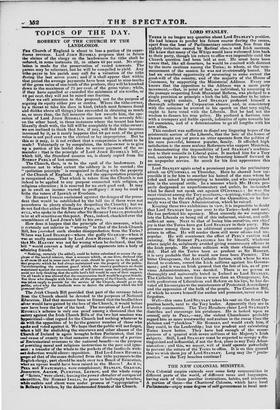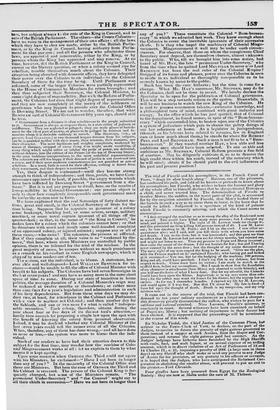THE NEW COLONIAL MINISTER.
OUR Colonial empire extends over some forty communities in different parts of the world, of different races and languages, having each of them peculiar institutions, habits, and interests. A portion of these—the Chartered Colonies, which have local Parliaments—enjoy some degree of self-government in local mat- hers, but subject always t ) the veto of the King in Council, and to acts of the British Parliament. The others—the Crown Colonies— have no voice in the management of their own affairs' : all the laws which they have to obey are made, either by the British Parlia- ment, or by the King in Council, having authority from Parlia- ment for that pur;iose ; and all the persons who administer those laws, are appoint al and removeable, either by the King, or by persons whom the King has appointed and may remove. At no time, however, di 1 the BI nisi' Parliament or the King in Council, -except on the Slavery question, or when a colony seemed ripe for rebellion, trouble themselves much about the Colonies. Their attention being absorbed with domestic affairs, they have delegated their power o'er the Colonies to on individual—to the Colonial Secretary of State for the time be'ng. Until Parliainent was reformed. some of the larger Colonies were partially represented in the House of Commons by Members for rotten boroughs; and they thus subjected their Sovereien, the Colonial Minister, to some slight degree of responsibility. But wnli the Reform of Parlia- ment, the Colonies lost even that slight degree of representation; and they are now completely at the mercy of the nobleman or gentleman who may happen to preside over the Colonial Office in Downing Street. We are not to wonder, therefore, that what BENTHAM said of Colonial Government fifty years ago, should still be true.
" Government from a distance is often mischievous.to the people submitted to it. Government is always, as respects them, in a state either of jealousy or
indifference. They are neglected or pillaged ; they are made places of banish- ment for the vilest part of society, or places to be pillaged by minions and fa- vourites whom it is desirable suddenly to enrich. The Sovereign, (viz., at pre-ens, Lord GLENELG,] at two thousand leagues distance from his subjects, can be acquainted neither with their wants, their interests, their manners, nor their character. The most legitimate and weighty complaints, weakened by reason of distance, stripped of every thing that might excite sensibility, of every thing which might soften or subdue the pride of power, are delivered, without defence into the cabinet of the Prince (at the top of Downing Street], to the most insidious interpretations, to the most unfaithful representations. The colonists are still too happy if their demand of justice is not construed into a crime, and if their most moderate remonstrances are not punished as acts of rebellion. In a word, little is cared for their affection, nothing is feared from their resentment, and their despair is contemned."
Yes, their despair is contemned—until they become strong enough to think of independence; and then, presto, we have Com- missioners appointed to heal, if possible, the angry wounds which have been inflicted by Downing Street " government from a dis- tance." But it is not our purpose to dwell, here, on the results of irresponsibility in Colonial Government : our present object is only to show how completely irresponsible such government must be under the system now in force.
We have explained that the real Sovereign of forty distant na- tions, peat and small„ is the Colonial Secretary of State for the time being. Suppose that he appoints as governor of a colony some bankrupt, blackleg lord, or some severe, savage, military martinet, or some naval captain ignorant of all things off the quarter-deck; or that, in the name of " the King in Council," he makes laws for a colony which the colonists cannot bear ; or that he dismisses with scorn and insult some well-founded complaint of an oppressed colony, or injured colonist ; suppose any or all of these cases,—who cares? The colonists, the persons so afflicted. But if they complain at all, their voice is so "weakened by dis- tance;' that here, where alone Ministers ate controlled by public opinion, there is no tribunal for the trial of the misdoer. In the great majority of cases, he escapes without so much punishment as a remark on his conduct in some English newspaper, which is .skipped by nine readers out of ten.
The system, not the individual, is to blame. A statesman, how- ever able and well-disposed—Lord WILLIAM BENTINCIL for in- stance—would be unable to fill the office of Colonial Minister with benefit to his subjects. The Colonies have had seven Sovereigns in the lest seven years ! and may have as many more in the same short space of time to come. During our state of transition in home politics, the average duration of a Colonial Monarch's reign may be reckoned at twelve months or thereabouts; or rather more than nine days for a year's legislation and administration in each of his forty dependencies. But from these nine days we may de- duct two, at least, for attendance in the Cabinet and Parliament with a view to matters not Colonial ; and then another day for the Sabbath, and one or two more f ,r what is called " indispen- sable recreation." Each colony, therefore, obtains during the year about four or five days of its distant lord's attention,- -hardly time enough for preparing a single law upon the spot with the benefit of knowing the colony from personal observation. Indeed, it may be douleed whether any Colonial Minister of the last :even years could tell the names even of all the Colonies. When, therefore, any of them has done wrong,—and all have done so more or less,—the system was more to blame than the indi- vidual.
Such of our readers as have had their attention drawn to this subject for the first time, may wonder how the machine of Colo- nial Misgovernment works at all : let us explain to them by what means it is kept agoing.
Upon some occasicn when GEORGE the Third mid not agree with his Ministers, he exclaimed—" Have I not been in longer than any of you ?" In the moaarchy- of the Colonial Office also there are Ministers. But here the case of GEORGE the Third and his Cabinet is reversed. The person of the Colonial King is fre- quently changed, but some of the Ministers remain. " The permanent Under-Secretary " and " the Counsel" might say to ell their chiefs in succession—" Have we not been in longer than any of you ?" These constitute the Colonial " Bum-bureaus cnicy " to which we adverted last week. They know enough about the Colonies to cover the inevitable ignorance of their successive eh efs. It is they who impel the machinery of Colonial Miago- verntnent. Misgovernment it well may be under such circum- stances. For observe, that those on whom the conspicuous Chief Secretary must depend, are themselves obscure, almost unknown to the public. Who, till we brought him into some notice, had heard of kir. HAY, the late " permanent Uuder-Secretary," who from the time when he quitted Lord Menvinha to serve o'er Lord BATHURST has been the real ruler of the Colonial Empire? Stripped of its forms and phrases, power over the Colonies' is.seen to reside in an individual so thoroughly irresponsible as to be scarcely known by name to the public. Such has been the case hitherto ; but the time is come for a change. What Mr. HAY'S successor, Mr. STEPHEN, may do for the Colonies, shall nut be done in secret. We hereby declare the Spectator to be open for the publication of Colonial grievances. This will be a step towards reform in the system. Meanwhile, it will be our business to watch the new King of the Colonies. He is said to possess uncommon talents,—extensive knowledge, and a philosophical turn of mind, combined with great industry and energy. In the office which he has just quitted, that of Counsel to the department, lie found means, in spite of the "Bum-bureau- cracy which surrounded him, to bestow upon one ofthe Colonies a system of judicature which puts to shame the paltry doings of our law reformers at home. As a legislator in jurisprudence, (though, as his labours have related to colonies, few in England care or know much about them,) lie stands far above Sir RosEar PEEL and Lord BROUGHAM. Such a man is not fit to be a " Bum- bureau-crat." if they wanted another Haar, a less able and less ambitious man should have been selected. To one so able and ambitious as Mr. STEPHEN, Colonial Reform presents a fine field of exertion. May he diligently cultivate it, so as to deserve the high credit thus within his reach, instead of the notoriety which he will surely obtain if he should yield to the evil influences of his past and present position I



























 Previous page
Previous page